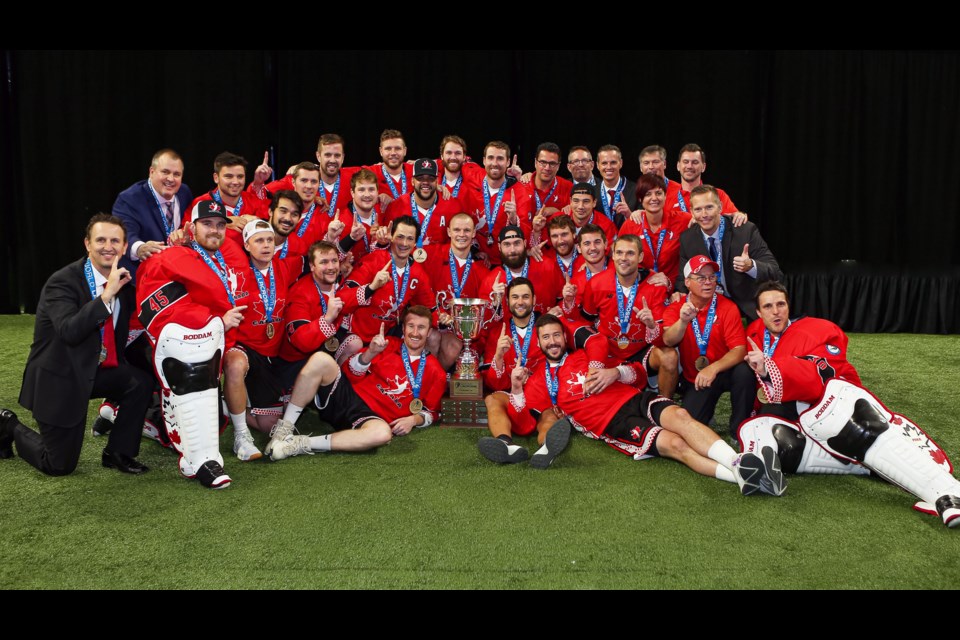Playing on home soil, the expectations of victory every game comes with its fair share of challenges.
But Canada persevered as they demonstrated a dominance at a whole new level in capturing the Cockerton Cup on Saturday at Langley Events Centre, defeating the Iroquois Nationals 19-12 in the gold-medal final at the 2019 World Lacrosse Men’s Indoor World Championship.
Canada trailed just twice -- and both times by only a single goal -- before they seized control in the second quarter, turning a 6-5 lead into a 10-6 advantage at the half. From there, Canada never looked back, shutting the door on the Iroquois Nationals to win the men’s indoor world championship for a fifth consecutive time.
All five victories at the quadrennial event have come at the expense of the Iroquois Nationals, and for a fifth straight time, it was the United States again winning bronze as the Americans edged England 11-8 in the third-place match.
Canada’s lineup was stocked with National Lacrosse League and Western Lacrosse Association players – including the Burnaby Lakers’ Matt Beers, Robert Church and Eli McLaughlin.
Just how dominant was Canada at the event? In six games – four during the round-robin and then the two playoff games – the team outscored the opposition 110-44 with an average margin of victory of 11 goals per game.
Over 360 minutes of lacrosse, Canada trailed just five times for a grand total of 9:28. And they were tied for just 22:36 of game action.
But they did all this with the weight of being expected to win, especially with the championship being contested at home.
“There is a lot of pressure representing Canada and the success that they have had,” admitted Canadian head coach Glenn Clark.
“Relief is the best description, and excitement, obviously,” he said when asked to describe the feeling of accomplishing what everyone fully expected them to do. “It is a long week, you put a lot into it and there is a lot of pressure representing Canada and the success they have had.”
“The expectations were big, especially playing on home soil, especially myself, growing up 10 minutes down the road,” said one-time New West junior Salmonbellie Curtis Dickson. “This is my third gold medal on the world stage, but it is extra special to be able to do it in my own backyard.”
Dickson scored five goals in the gold-medal game along with two assists.
“Honestly this is a really talented team and great coaching that taught us to stick to our guns and make sure we got better every game … I think the systems were in place for us to succeed and the players showed up in the big moments,” said Beers.
Players and coaching staff alike relished the fact they were able to celebrate the championship at home with friends and family in attendance.
“It is a great feeling winning it on home soil and obviously you have a lot of family members here to share it with. And the truth and the reality is, these are the people who have supported you to get to this place, so it means a lot to have that opportunity,” Clark said.
In Saturday’s final, Dane Dobbie led all scorers with 10 points, including three goals, with Church (four goals, one assist), Mark Matthews (one goals, five assists), Dhane Smith (three goals, one assist), Chris Corbeill (two goals, one assist) and Ben McIntosh (one goal, two assists) rounded out Canada’s scoring.
The Iroquois Nationals were led by five goals and six points from Zed Williams while Randy Staats and Cody Jamieson had a goal and three assists apiece.
Jamieson was named the Most Valuable Player. He scored 11 goals and 28 points in four round-robin games and added another three goals and 10 points in two playoff games.
Church finished the six-game run (four round-robin and two playoffs) with 11 goals and 18 assists, including a team-best 15 assists over the four round-robin games. McLaughlin played in just two games, scoring seven times and drawing six helpers, while Beers chipped in a goal. Along with Dickson, the New West connection with the team was assistant coach Curt Malawsky, a 'Bellie alumnus and former head coach of the Burnaby junior Lakers.
Staats and Matthews were named as the forwards to the All-World Team. Transition player Joel White (United States) and Canadian defenders Graeme Hossack and Kyle Rubisch as well as goaltender Mike Poulin rounded out the team.
The President’s team (the all-star team for the non-Blue Division teams) consisted of forwards Robert Raittila (Finland) and Matthew Taylor (Australia), transition player Adrian Balasch (Austria), David Beckmann (Germany) and Markus Mattila (Finland) on defence and Germany’s Craig Wende (goaltender).
Burnaby’s Gajic brothers were the offensive leaders of Team Serbia, with Ilija racking up 15 goals and 28 assists over four round-robin games and three playoff matches, while Alex counted 20 goals and nine helpers. Fellow Burnaby product Nik Bilic chipped in seven goals and nine assists from his defensive position. Serbia finished up with a 3-1 record, second overall in the Yellow Division, before falling 14-9 to Ireland in their final playoff game.
The Lakers’ Tristan Rai represented Australia and was among all point leaders during both the playoffs and round-robin portion of the tourney. He finished second behind teammate Matthew Taylor for the scoring title, cashing in 13 goals and a tourney-best 36 assists over seven games. Australia sat second at 3-1 in the Orange Division, beating Germany 13-6 to finish the series on a winning run.
New Westminster’s Lyndon Bunio, meanwhile, played for England. He would tally 12 goals and 12 assists over seven games, while the Burnaby Lakers’ Sam Clare contributed six goals and three assists from his transition position.
New West was also represented by Andrew McBride, who played for Ireland, and Iain Murray, who played for Scotland.



